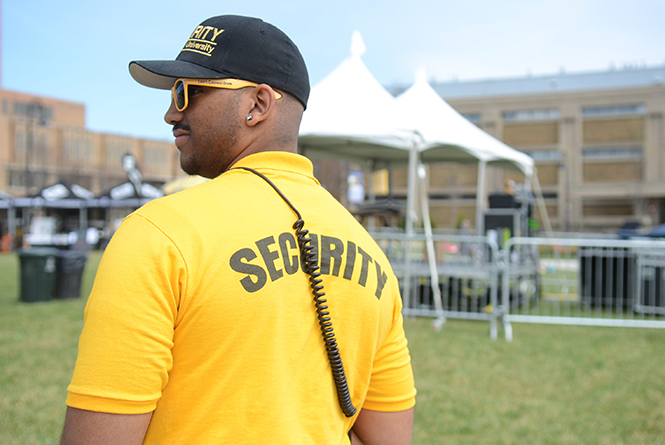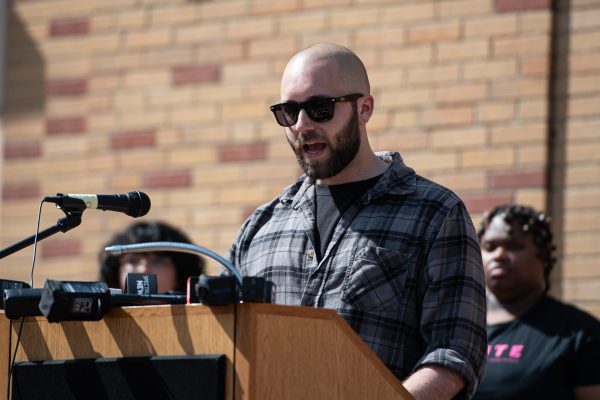KSU security team offers many services to students
Julian Johnson, a Kent State Security guard, waits near the stage before the Flashfest concert starts, Thursday, April 24, 2014. Guards are each given a radio in case they need to make a call to police.
May 1, 2014
Established in 1973, the Kent State security team is currently comprised of nearly 50 students who work to ensure the safety of students and faculty on campus.
“Our program is the first of its kind in the country,” Security Director Brian Hellwig said. “We continue to be a model for other universities around the country and internationally.”
Hellwig said they have divided the campus into five areas and have two or three security aides working in each section from 8 p.m. until 4 a.m. every day of the week.
Hellwig said students must have one 100 hours of training before they become a security aide for Kent State. This training includes teaching how a security aide can successfully communicate with difficult people, how to quickly de-escalate tense situations, and how to use fire safety equipment and perform first aid.
“The training is primarily hands-on,” Hellwig said. “The first 12 nights that a security aide works, they will be paired up with a field training aide, and there are a variety of topics they go through each night.”
Sophomore criminology and justice studies major Michael Fristick, who has worked as a security aide for the last two semesters, said the training was more informative than challenging.
“It is not difficult training, but there is a lot to learn,” he said. “You have to lean a lot of codes and signals to use over the radio.”
Hellwig said each security aide is equipped with a radio they can use to call the police if a situation requires it.
“We don’t have any detaining powers; we are not police officers,” Fristick said. “If we were in immediate danger, we would call the police.”
Fristick said the role of a security aide is to act as deterrents to a possible crime.
“It’s like the buddy system,” he said. “If you see someone walking alone, they are more likely to be attacked than someone who is walking with a security aide.”
Fristick said he thinks it is for the best that security aides do not carry any weapons because their main role is to enforce hall policy.
“We have our radio and our verbal judo, that’s it,” Fristick said.
Fristick said “verbal judo” is taught to the security aides during training and is intended to resolve situations in a peaceful way through conversation.
“It helps a lot in incidents when someone is being aggressive or they don’t like what you have to say to them,” he said.
Fristick said the majority of his shifts go by without any incident involving a student.
“Most nights it is pretty quiet,” he said. “You do have the incident once in a while where someone is breaking hall policy but nothing too serious has happened, which means something is going right here.”
Hellwig said his security team is made up of men and women.
“I think there is a misconception out there that you have to be big and tough to be a security aide, and that is certainly not the case,” Hellwig said.
Hellwig said female security aides could be more effective than male aides in certain situations.
“I think that female security aides can be more effective, particularly when dealing with other females about alcohol incidents,” he said. “They are more likely to cooperate with a female and not be as aggressive with a female security aide.”
Brooke Fadeley, junior psychology major and security aide, said she feels other students respect her in the same way they would respect a male security aide.
“I have never had an experience with not being treated the same because I’m a female,” she said.
One of the services offered to students by the security team is an escort by a security aide.
“If an escort request comes through our dispatch, [then] the dispatcher will send whatever security aide is closest to the area to do the escort,” Hellwig said.
On average, he said campus security sees two or three escort calls each night.
“It is mostly women that call, but we do have males call as well,” Hellwig said. “We will escort anyone from anywhere on campus to anywhere on campus.”
If a particular escort covers a long distance, he said sometimes they can have a supervisor do the escort with a vehicle.
Despite the fact that this service is offered, some students interviewed in the library after midnight said they feel safe on campus and are not likely to call for a security escort.
Sophomore nursing major Megan Arno said she is often in the library studying late at night, but she has never felt the need for a security escort.
“I live in Beall Hall, so it’s close, and I’m not really worried about it,” she said.
Freshman sociology major Timothy Williams said that while he does not see the need for an escort for himself, he likes that it is an option for his friend, freshman exploratory major Halle Byrd.
Byrd said she would consider calling a security escort if she felt she needed one.
“If it was really late, but not on a regular day though,” she said.
Officer Michquel Penn of Kent State Police Services said they work hand-in-hand with the residence hall security.
“Having a security team that is there logging and doing the rounds in addition to the RAs gives us extra coverage,” she said.
The security escort service, Penn said, is a valuable part of what the security aides do.
“Realistically, it would not be something that the police officers could do on a regular basis,” she said. “Having a service that allows students to call up if they feel nervous or uncomfortable walking across campus late is excellent.”
Penn said the fact that the security aides have direct radio contact with Police Services helps the students feel safer on campus.
The requirements for being a security aide are a minimum 2.3 GPA, and applicants must also be a Kent State student.
Contact Nathan J. Havenner at [email protected].
























